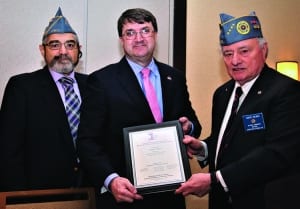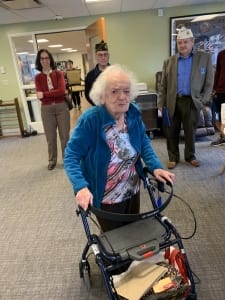By Cara Rinkoff
The Jewish War Veterans National Commander Harvey Weiner testified before a joint hearing of the House and Senate Veterans’ Affairs Committees on February 26. Weiner decided to deviate from the typical testimony given by our organization’s commander, and instead submitted our legislative priorities in a written document.
For his oral testimony before the committees, Weiner decided to discuss courage. He urged the members of the House and Senate to show courage by standing up for veterans and members of the military. “On behalf of all veterans, past and present, and all service personnel, past and present, I am asking each and every one of you to show courage by doing your job and by doing right, regardless of the political consequences, including the possibility, or even the probability, that you will lose your job by being voted out of office,” Weiner said.
In his testimony Weiner addressed two main areas where legislators must show courage. The first is to make sure military funding is not used to build a wall along the U.S. border with Mexico. The other is for Congress to “take back the war powers that the framers of the Constitution and your own 1973 War Powers Resolution gave you.”
Here is the entirety of Weiner’s oral testimony:
Chairman Moran and Chairman Takano, Ranking Members Tester and Roe, I am Harvey Weiner, a Vietnam War combat veteran and the National Commander of the Jewish War Veterans of the U.S.A., America’s oldest active continuous veterans’ association. We will be celebrating our 125th anniversary next year. American Jews have fought in all of America’s wars in a proportion greater than their proportion in the general population.
I want to speak to you this afternoon about courage. Members of the armed services will risk his or her life on the battlefield to serve this great nation and to do the job assigned. Hundreds of thousands of American soldiers have given their lives and millions of American soldiers and their families have made other sacrifices in this regard. They had the right stuff and displayed great courage. They took enormous risks because their country called and because it was the right thing to do. On behalf of all veterans, past and present, and all service personnel, past and present, I am asking each and every one of you to show courage by doing your job and by doing right, regardless of the political consequences, including the possibility, or even the probability, that you will lose your job by being voted out of office.
When you, who, implicitly or explicitly, sent us off to war and asked us to do the right thing at the risk of our lives, it is a shanda if you are unwilling to take that risk to do right yourselves, rather than what is politically expedient. Shanda is Yiddish for “shameful.” The risk of losing your job pales in comparison to the risk we take of losing our lives. I was reviewing the John F. Kennedy Profiles in Courage winners of the award that is the nation’s preeminent award for elected officials and public servants. For them and for you, it is the Nobel Prize, the Oscar, the Lasker, the Pulitzer. I give you these examples.
Carl Elliott was a Congressman from Alabama for eight consecutive terms from 1949 to 1965. He was a Democrat, but he authored and voted for the National Education Defense Act, which he knew would lead to his removal as a Congressman in 1964. He was right, but he did what was right.
Charles Weltner, also a Democrat, was a Congressman from Georgia who dropped out of his race for a third term rather than seek reelection and be bound by a party loyalty oath to support the candidacy of segregationist Lester Maddox.
Bob Inglis, whom many of you know, is a Republican and was a Congressman from South Carolina. He reversed himself on the issue of climate change because he felt it was the right thing to do. He knew that it would probably mean the demise of his political career and it did.
We, who died, who were wounded, who survived, or who risked our lives in the military to do the right thing because America asked us to, are asking you to do the right thing, merely at risk of losing your jobs.
Do not take funds away from the military, including from their daycare and schools, to build a border wall, because it is politically expedient for you to do so.
In addition, the Constitution, which you swore under oath to uphold, vests the power to declare war solely in the hands of Congress and not in the President, who is solely the Commander in Chief. However, since World War II, Congress, as a practical matter, has ceded its Constitutional responsibility to the President in the semantic guise of so-called “emergencies” and “police actions.” War is too important to be in the hands of one person, and since World War II, the usurping of the war power by both Democratic and Republican presidents has led this nation into disaster after disaster and caused the unnecessary deaths of over a hundred thousand of my comrades-in-arms, my brothers and my sisters. An after-the-fact toothless Congressional resolution is not enough. Take back the war power that the framers of the Constitution and your own 1973 War Powers Resolution gave you.
When Abraham Lincoln was in the Congress, he wrote the following:
“The provision of the Constitution giving the war-making power to Congress, was dictated, as I understand it, by the following reasons. Kings had always been involving and impoverishing their people in wars, pretending generally, if not always, that the good of the people was the object. This our convention understood to be the most oppressive of all Kingly oppressions; and they resolved to so frame the Constitution that no one man should hold the power of bringing this oppression upon us.”
As a cantankerous football coach in my neck of the woods is fond of saying, “Do your job!” Risk your jobs to do the right thing! In the long run, it is not just your constituents that you must face. You must face your children, your grandchildren, your descendants, and history. Also, you must face yourself and your conscience. Become a candidate for the Profiles in Courage award.
We, the veterans of America, do not just ask you to do the right thing despite the political consequences. We demand it, and we are entitled to do so. Thank you.
The written testimony submitted to the committee included JWV priorities of opposition to the privatization of the Department of Veterans Affairs, as well as the passage of legislation to reduce the number of veteran suicides, assist homeless veterans, and expand the current eligibility period for those who wish to become members of JWV.
You can find a link to the document Weiner submitted to the committees on our website.
Volume 74. Number 1. 2020



